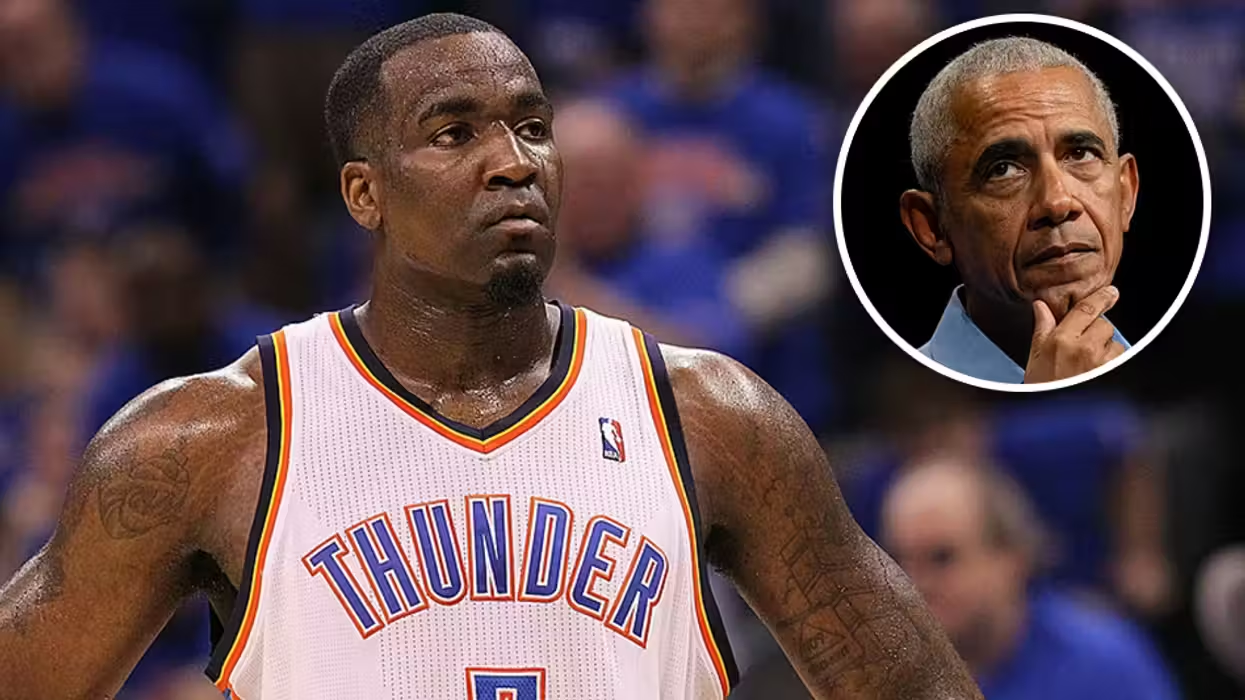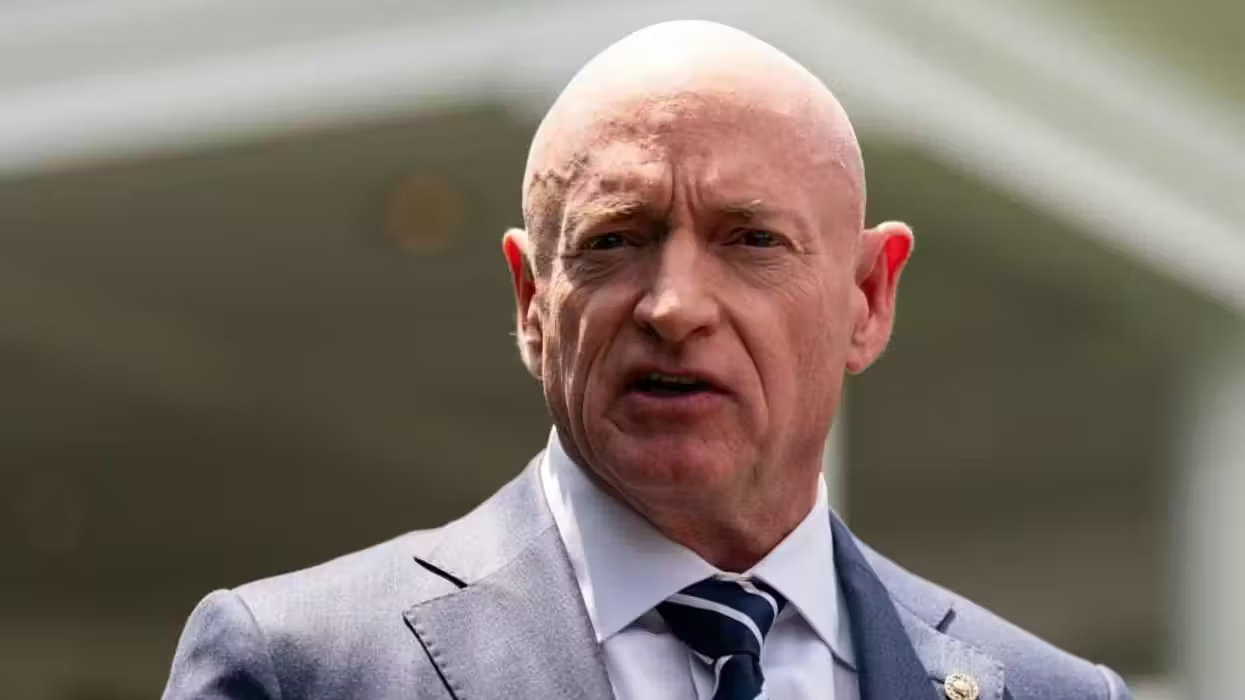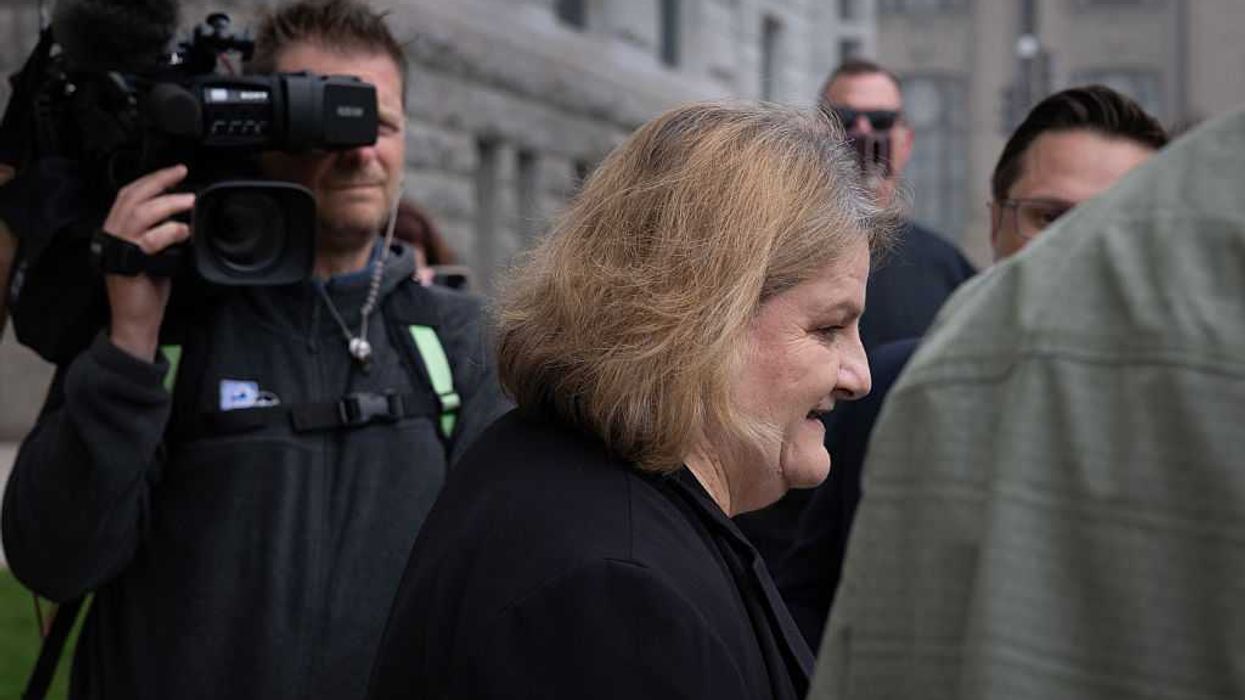WASHINGTON (AP) — Six-term Republican Sen. Thad Cochran and tea party-backed challenger Chris McDaniel dueled at close quarters in Mississippi's primary election Tuesday night, an epic struggle in a party divided along ideological lines. GOP governors in South Dakota and Alabama coasted to renomination.
On the busiest night of the primary season, former South Dakota Gov. Mike Rounds won the Republican nomination for the Senate, — and instantly became the favorite to pick up a seat for his party in its drive to capture a majority this fall.
 A spectator shows her support as U.S. Senate challenger Chris McDaniel speaks Friday, May 30, 2014 at the Jones County Junior College Fine Arts Center in Ellisville, Miss. during a campaign rally. McDaniel is challenging Republican Sen. Thad Cochran. (AP Photo/The Hattiesburg American)
A spectator shows her support as U.S. Senate challenger Chris McDaniel speaks Friday, May 30, 2014 at the Jones County Junior College Fine Arts Center in Ellisville, Miss. during a campaign rally. McDaniel is challenging Republican Sen. Thad Cochran. (AP Photo/The Hattiesburg American)
There were Senate primaries in seven states, including Iowa, where Republican state Sen. Jodi Ernst battled four rivals for the right to oppose Rep. Bruce Braley in the fall for a seat long in Democratic hands.
Five states picked nominees for governor, including California, where Democrat Jerry Brown sought renomination to a fourth term.
The marquee contest of the night was in Mississippi, where Cochran and McDaniel remained locked in a close race as the vote count mounted. Returns from nearly half the precincts showed Cochran with slightly more than 50 percent of the vote and McDaniel with 48 percent. A third candidate was drawing enough support to raise the possibility that neither of the two main contenders would gain a majority setting up a runoff on June 24.
Dozens of nomination races for House seats dotted the ballot, too, including 38 in California's open primary system, which awarded spots on the November ballot to the two top vote-getters regardless of party.
The Senate contest between Cochran and McDaniel in Mississippi drew top billing, a heated race between a 76-year-old pillar of the GOP establishment who has helped funnel millions of dollars to his state and a younger state lawmaker who drew backing from tea party groups and former Republican vice presidential candidate Sarah Palin. The campaign took a turn toward the sensational when four men, all McDaniel supporters, were arrested and charged with surreptitiously taking photographs of the senator's 72-year-old wife, who suffers from dementia and has long lived in a nursing home.
One black group, "All Citizens for Mississippi" Cochran's supporters advertised in two black newspapers and handed out flyers in the race's final days as they appealed to traditionally Democratic voters to extend his career.
Vicksburg Mayor George Flaggs, a black Democrat who served for 26 years in the state Legislature, said he was supporting the white, Republican incumbent. He said the senator has secured federal funding for a U.S. Army Corps of Engineers research station in his city, adding, "It is incumbent for me to vote for Thad."
State law required the primary leader to gain at least 50 percent of the vote to win the nomination outright. The presence of a third Republican on the ballot, Thomas Carey, raised the possibility that a June 24 runoff between the top two finishers would be needed.
The race was arguably the year's last good chance for the tea party wing of the party to topple an establishment favorite in a Senate primary, following losses in Texas, North Carolina, Georgia and Kentucky.
The impact of the race seemed less in the national battle for control of the Senate, where Republicans need to gain six seats this fall to capture a majority. Former Rep. Travis Childers captured the Democratic nomination to oppose the winner of the Cochran-McDaniel race in Mississippi, a state that last elected a Democratic senator in 1982.
The national stakes were clearer in Iowa, where Democratic Sen. Tom Harkin's retirement created an open seat that Democrat Braley, a fourth-term lawmaker, sought to fill, as did Ernst and three rival Republicans.
 Republican U.S. Senate candidate Joni Ernst and her husband Gail, right, leave the polling station after casting their ballots in Iowa’s Republican primary in Red Oak, Iowa, Tuesday, June 3, 2014. Five Republicans are competing for the GOP Senate nomination and a chance to face Democrat Bruce Braley, who is running unopposed. (AP Photo/Nati Harnik)
Republican U.S. Senate candidate Joni Ernst and her husband Gail, right, leave the polling station after casting their ballots in Iowa’s Republican primary in Red Oak, Iowa, Tuesday, June 3, 2014. Five Republicans are competing for the GOP Senate nomination and a chance to face Democrat Bruce Braley, who is running unopposed. (AP Photo/Nati Harnik)
Ernst fashioned her rise in the race on memorable television commercials.
"I grew up on an Iowa farm castrating hogs, so when I get to Washington, I'll know how to cut pork," she said in one of them, concluding with a smile, "Let's make 'em squeal." She was able to transcend many of the intra-party divisions that flared in other races, gathering support from Palin and former Sen. Rick Santorum as well as Mitt Romney, the party's 2012 presidential candidate.
Her rivals on Tuesday's ballot included Mark Jacobs, the former CEO of Reliant Energy; former U.S Attorney Matt Whitaker; businessman Scott Schaben and Sam Clovis, a college professor. A state convention will be required to select a nominee if none of the primary contenders gains at least 35 percent of the vote.
In other Senate races, appointed Democratic Sen. John Walsh and Republican Rep. Steve Daines in Montana each faced a pair of primary rivals en route to a likely race in the fall that the GOP is expected to target as an opportunity to gain a seat.
Republicans eyed another fall pickup opportunity in South Dakota, where Democratic Sen. Tim Johnson has chosen to retire and Rounds easily eclipsed his rivals for the GOP nomination. Rick Weiland, making his third try for a seat in Congress, was unopposed by other Democrats.
Sen. Cory Booker, D-N.J., had no competition for renomination, and four Republicans sought to oppose him in the fall.
In New Mexico, two Republicans, former state party chairman Allen Weh and attorney David Clements, vied for the nomination to oppose Democratic Sen. Tom Udall.
Democrats fielded no candidates in Alabama to oppose GOP Sen. Jeff Sessions, who was renominated without primary competition.
California's open primary law produced a crowded ballot, with three-term incumbent Gov. Brown and 14 others competing for primary votes. Republicans included Neel Kashkari, a former Treasury Department official, and Tim Donnelly, a state assemblyman and conservative favorite.
Republican governors winning renomination included Robert Bentley in Alabama and Dennis Daugaard in South Dakota. Both are heavily favored to return to office in the fall.
New voter identification laws were in effect in Mississippi and Alabama, although there were no difficulties immediately reported.
—

 A spectator shows her support as U.S. Senate challenger Chris McDaniel speaks Friday, May 30, 2014 at the Jones County Junior College Fine Arts Center in Ellisville, Miss. during a campaign rally. McDaniel is challenging Republican Sen. Thad Cochran. (AP Photo/The Hattiesburg American)
A spectator shows her support as U.S. Senate challenger Chris McDaniel speaks Friday, May 30, 2014 at the Jones County Junior College Fine Arts Center in Ellisville, Miss. during a campaign rally. McDaniel is challenging Republican Sen. Thad Cochran. (AP Photo/The Hattiesburg American)





